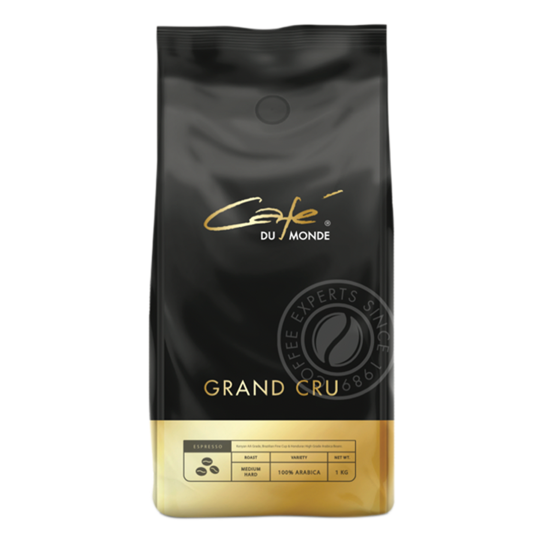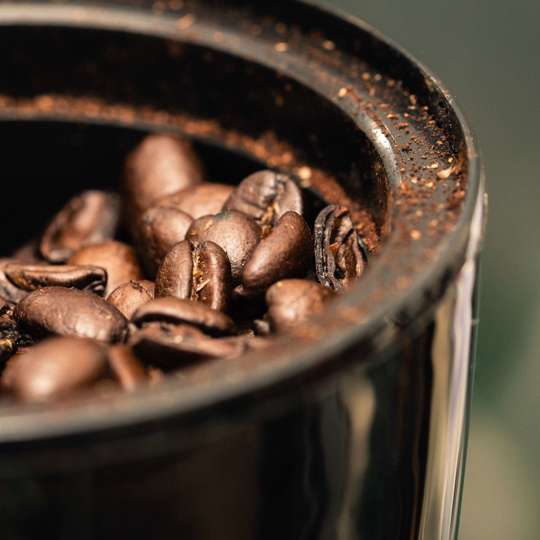
Grand Cru Espresso Beans
This is our 100% Arabica espresso coffee blend. It has the best Kenyan AA Grade beans for acidity, citrus notes and a chocolate after taste.
£25.65
View
Find out about the coffee production process.
View Our CoffeeCoffee is a hugely popular drink across the globe and is therefore grown on a large scale - but have you ever thought about the coffee production process? The production process of coffee is a massive source of income for people around the world with 25 million people relying on coffee for a living - which is approximately half of the population of England in 20212! Growing and producing coffee beans is not a simple process though and there are a lot of factors to be considered, from temperature to rainfall. If you are wondering how coffee is produced, our guide below will teach you all about the process.
Coffee is grown in more than 50 countries around the world. The five biggest green bean exports for May 2011 were Brazil (28%), Colombia (6.3%), Kenya (0.82%), Ethiopia (3.11%) and Sumatra (4.92%). These are countries with hot climates. Coffee only grows between 23 degrees North and South of the equator, in the Tropics of Capricorn and Cancer.
Each country grows their own types of coffee beans. From El Salvador there is Monte Sion, Jamaica has Blue Mountain, Colombia brings Excelso, Brazil is home to Monte Cristo, Kenya produces AA Grade, Ethiopia has Yirgacheffe whilst Sumatra brings Takengon coffee beans to the table.

Coffee trees need specific conditions in order to grow. They are evergreen trees that grow to a height between 14 and 20 feet - but are usually cultivated to be a lot smaller for farming.
Arabica coffee grows at temperatures between 15 degrees celsius and 24 degrees celsius. They can also need up to 2000 millimetres of rainfall per year. Arabica only grows from 1300 metres above sea level - which is higher than the Burj Khalifa (828m). However, at higher altitudes bad frosts are more common which can spoil a coffee tree's harvest.
It is important that these conditions are all met in order to grow coffee to meet the demands of coffee lovers. It is estimated that each tree will produce around 1kg of green coffee per year. A quarter of a billion coffee trees were needed to produce green coffee imports just for the UK between May 2011 and April 2012. That would cover an area the size of Greater London!

We have broken down the coffee production process into four steps:
The coffee fruit that is harvested is called a cherry. The name is mostly because it is the same size, shape and colour as an actual cherry. The growing process starts with flowering blossoms, which are then followed by oval cherries, turning from green to red as they ripen, then gradually drying out. They take around 7-9 months to grow.
Once ripe, the cherries are harvested. Because of the extreme nature of its growing environment, Arabica berries have to be picked and sorted. On average a picker can gather around 90kg of coffee cherries each day. That is 1.5 times the average person’s body weight!
Once picked and sorted, cherries can be processed using 2 complicated procedures to remove the pulp and parchment and extract the green beans. The method of separating the coffee bean from the cherry depends on the producer and location.
The dry process is where the cherries are spread out to Sun-Dry. Dry processing is most common in arid countries such as Brazil, Kenya and Ethiopia. It requires less equipment.
The wet process is where the cherries are washed in large tanks which loosens the pulp and skin. Further screening, fermenting and sieving breaks down the excess pulp and the beans are layed out to dry.
After the beans have been extracted, they are graded and sorted by hand according to size and quality. There are several different national systems for grading green coffee depending on its origin. For example, most Caribbean and Central American producers indicate quality by denoting altitude. Colombia grades by size (Excelso, Supremo), as does Kenya (AB grade, AA grade) and Brazil by origin and defective bean amount.
Only around 20% of harvested and processed coffee beans are considered to be a premium bean of the highest quality after sorting.
Green coffee is exported worldwide to many countries, ready for roasting, most commonly in 60kg sacks made from hemp.
The top five countries based on amount of imports of 60kg bags in April 2012 was: USA - 2,042,104 bags, Germany - 1,885,151 bags, Italy - 645,913 bags, Japan - 567,503 bags and UK - 370,485 bags.

This is our 100% Arabica espresso coffee blend. It has the best Kenyan AA Grade beans for acidity, citrus notes and a chocolate after taste.
£25.65
View